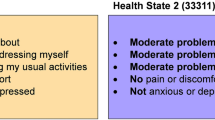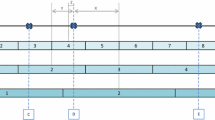Summary
We conducted a micro study to elicit health state descriptions and utility values, using the EuroQol instrument, from a sample of acutely ill inpatients on 5 wards at University College London Medical School. Most current work to date has elicited such descriptive and valuation data from random surveys of the general population. One problem with this is that most responders from the general population have not actually experienced the states being valued. Our goal was to ascertain whether there were any differences between the values given by inpatients and those of the general population. However, the small sample size of patients included in our feasibility study means our conclusions must remain tentative. Nevertheless, the results suggest that patients give higher values than the general population. We suggest that more research needs to be done eliciting values from patients.
Similar content being viewed by others
References
The EuroQol Group. EuroQol — a new facility for the measurement of health related quality of life. Health Policy 1990; 16: 199–208
Nord E. EuroQol: health-related quality of life measurement. Valuations of health states by the general public in Norway. Health Policy 1991; 18: 25–36
Sintonen H, editor. Discussion paper no. 2. EuroQol conference proceedings: Helsinki. Kuopio: Department of Social Sciences, University of Kuopio, 1993
Carr-Hill RA. A second opinion: health related quality of life measurement — Euro style. Health Policy 1992; 20: 321–8
The EuroQol Group. EuroQol — a reply and reminder. Health Policy 1992; 20: 329–32
Rosser RM. From health indicators to quality adjusted life years: technical and ethical issues. In: Hopkins A, Costain D, editors. Measuring the outcomes of medical care. London: RCP Publications, 1990: 1–16
Selai CE, Rosser RM. Good quality quality? Some methodological issues. J R Soc Med 1993; 86: 440–3
Sackett D, Torrance G. The utility of different health states as perceived by the general public. J Chronic Dis 1978; 31: 697–704
Froberg D, Kane R. Methodology for measuring health preferences III: population and context effects. J Clin Epidemiol 1978; 42: 585–92
Rosser RM, Kind P. A scale of valuations of states of illness: is there a social consensus? Int J Epidemiol 1978; 7 (4): 347–58
Walker SW, Rosser RM, editors. Quality of life assessment: key issues in the 1990s. London: Kluwer Academic Publishers, 1993
Fallowfield L. Quality of life: the missing measurement in health care. Human Horizons Series. London: Souvenir Press (E&A) Ltd., 1990
Stensman R. Severely mobility-disabled people assess the quality of their lives. Scand J Rehabil Med 1985; 17: 87–99
Rosser RM. A health index and output measure. In: Walker SR, Rosser RM, editors. Quality of life assessment: key issues in the 1990s. London: Kluwer Academic Publishers, 1993: 151–78
Kind P, Rosser RM. Death & dying: scaling of death for health status indices. In: Barber B, Gremy F, Uberla K, et al., editors. Lecture notes on medical informatics. Springer-Verlag, 1979: 28–36
Rosser RM. Forwards to the past: some thorny issues revisited. Paper presented at a joint meeting of the WHO and Fondation Ipsen; 1993 Jul 2–3: Paris
Morgado A, Raoux N, Jourdain G, et al. Over-reporting of mal-adjustment by depressed subjects. Soc Psychiatry Psychiatr Epidemiol 1991; 26: 68–74
Hermann BP. Developing a model of quality of life in epilepsy: the contribution of neuropsychology. Epilepsia 1993; 34 Suppl. 4: S14–21
Williams A. The importance of quality of life in policy decision making. In: Walker SR, Rosser RM, editors. Quality of life assessment: key issues in the 1990s. London: Kluwer Academic Publishers, 1993: 427–39
Williams AW, Kind P. The present state of play about QALYs. In: Hopkins A, editor. Measures of the quality of life and the uses to which such measures may be put. London: RCPPublications, 1992: 21–39
Spiegelhalter DJ, Gore SM, Fitzpatrick R, et al. Quality of life measures in health care. III: Resource allocation. BMJ 1992; 305: 1205–9
Author information
Authors and Affiliations
Rights and permissions
About this article
Cite this article
Selai, C., Rosser, R. Eliciting EuroQol Descriptive Data and Utility Scale Values from Inpatients. Pharmacoeconomics 8, 147–158 (1995). https://doi.org/10.2165/00019053-199508020-00006
Published:
Issue Date:
DOI: https://doi.org/10.2165/00019053-199508020-00006




